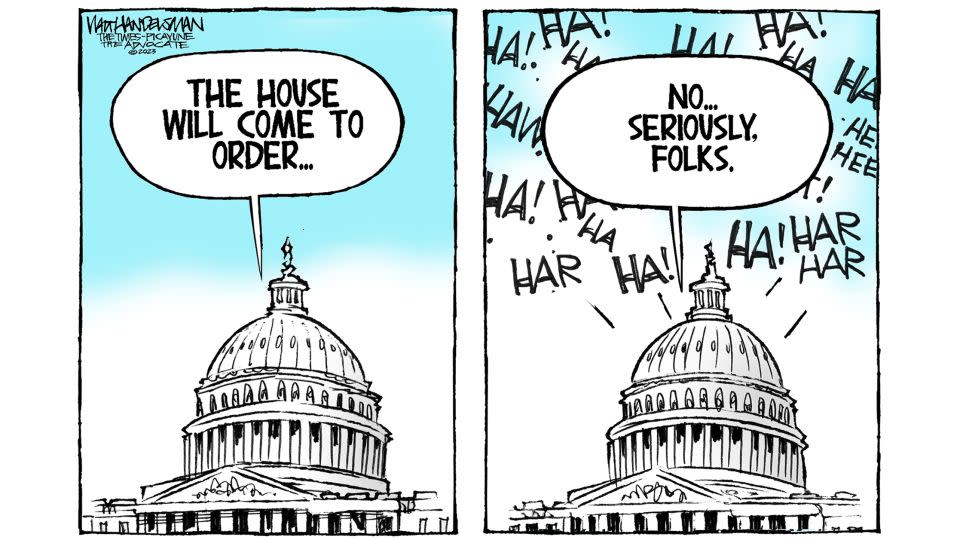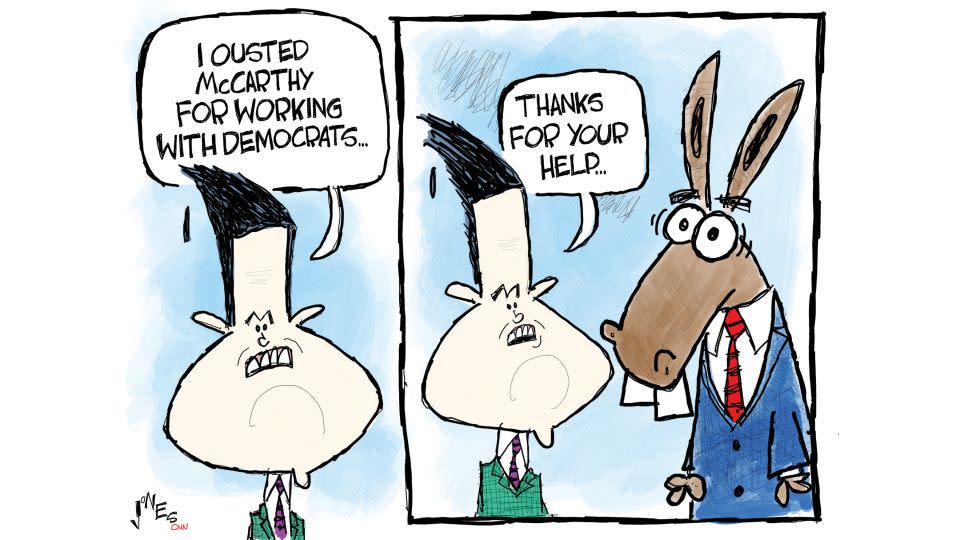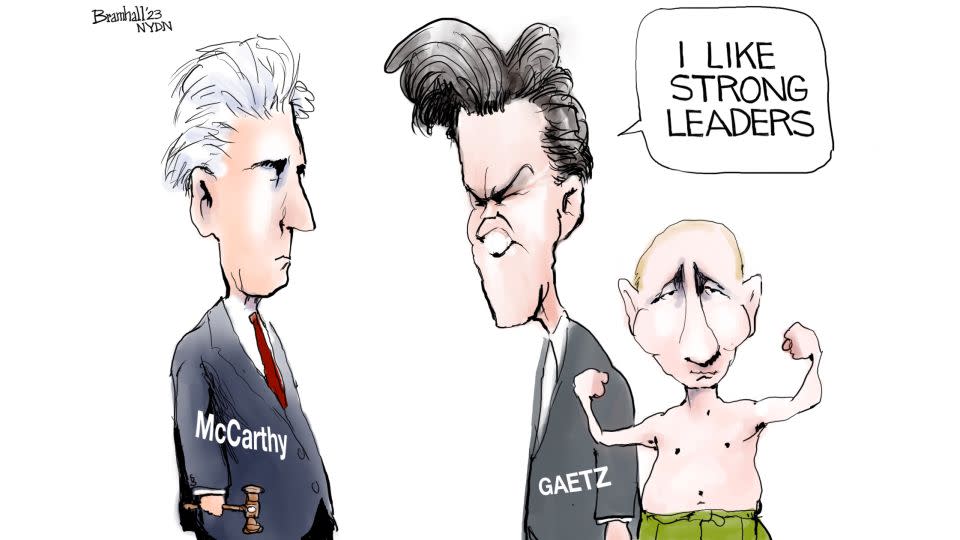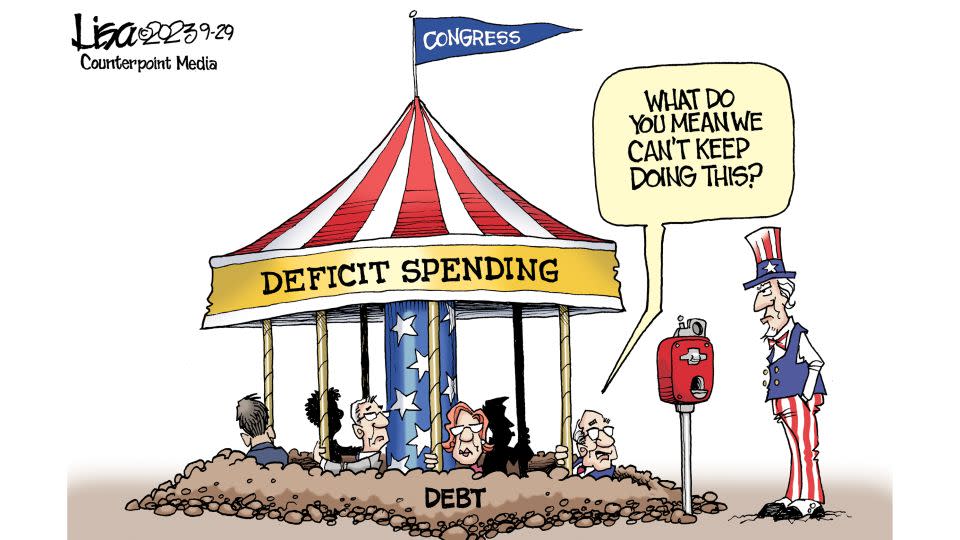Opinion: The chaos president inspires the chaos party
- Oops!Something went wrong.Please try again later.
- Oops!Something went wrong.Please try again later.
- Oops!Something went wrong.Please try again later.
- Oops!Something went wrong.Please try again later.
During a Republican presidential debate in December 2015, CNN’s Wolf Blitzer asked former Florida Gov. Jeb Bush about Donald Trump’s call to ban Muslims from entering the US after the San Bernardino terrorist attack. “This is not a serious proposal,” said Bush. “In fact, it will push the Muslim world, the Arab world away from us at a time when we need to reengage with them to be able to create a strategy to destroy ISIS.”
“So Donald, you know, is great at — at the one-liners, but he’s a chaos candidate. And he’d be a chaos president.”
Bush, who soon would drop out of the presidential race, arguably got that part right. But what he didn’t foresee was that the Republicans were on their way to becoming the chaos party.
The final confirmation of that arrived at 4:46 pm ET Tuesday when the gavel came down, signaling the unprecedented ouster of House Speaker Kevin McCarthy at the hands of Rep. Matt Gaetz, who is often described as a “chaos agent.”
The stunning move raised three urgent questions: Can Republicans unite around a replacement for McCarthy? Will the fractured House majority find a way to keep the federal government open before funding runs out on November 17? And will Congress vote to continue funding Ukraine’s defense in its war against Russia?
Trump didn’t intervene to save McCarthy, who had supported him weeks after the January 6, 2021, attack on the US Capitol. Instead, the former president helped stir the chaos: toying with the idea of becoming speaker himself, teasing that he might visit Capitol Hill for the first time since the January 6 insurrection and then abruptly endorsing Rep. Jim Jordan for speaker.
But “the breakout star of this ignominious circus,” Jill Filipovic wrote, was Gaetz. Kevin McCarthy “isn’t exactly a hero or an admirable person. He has thrown his support behind Trump, gone after Biden without evidence and for political gain, and caved time and again to the far-right wing of his party. … But he does at least appear to be grounded and interested in governing, not showboating.”
“Gaetz, on the other hand, seems interested in a toxic combination of attention and destruction. That so many in his party are following him in his annihilation mission is yet another confirmation that this is not a party focused on getting things done for the American people. It’s a party focused on emulating and grabbing the attention of the reality TV star former president who may have permanently broken this country.”

Historian Julian Zelizer put the events in longer-term context: “Like Speakers Newt Gingrich, John Boehner and Paul Ryan before him, McCarthy has become one more Republican leader who believed that he would be able to contain the destabilizing forces that he courted and emboldened within his coalition only to fall victim to them instead…”
“Even Gingrich, one of the pioneers of smashmouth partisanship within the Party of Lincoln, published an op-ed in The Washington Post Tuesday calling on the GOP to expel the leader of the removal vote, Rep. Matt Gaetz of Florida. The firebrand who taught generations of fellow conservatives how to abandon guardrails, someone who once stood as one of former President Donald Trump’s staunchest supporters, finally found something that ‘crosses the line.’ When Gingrich says something has crossed the line, that says a lot.”
Within hours of McCarthy’s ouster, former House speaker Nancy Pelosi was kicked out of her coveted Capitol office space in what Zelizer called “petty partisan vengeance after the Democrats reasonably decided not to bail McCarthy out by voting for him as speaker when all of his own party members wouldn’t…”
In Republican commentator Patrick T. Brown’s view, Democrats made precisely the wrong choice by voting with the eight GOP renegades against McCarthy. “Instead of siding with stability, Democrats chose to double down on partisanship. For the party that has talked repeatedly about wanting to restore norms of good government, it was a cynical display of short-term political gain at the expense of the long-term functioning of our political institutions…”

“Democrats didn’t even have to affirmatively support McCarthy; simply voting ‘present’ would have lowered the threshold necessary for the former speaker to maintain a majority. Instead, Democrats helped those they see as ‘extreme MAGA Republicans’ while allowing the House to be thrown into chaos amid the fraught prospect of choosing a new speaker as the clock ticks down to the next shutdown deadline.”
SE Cupp marveled at how the political parties have changed. “The Republican Party is no longer a big tent that can comfortably contain different factions and a range of ideas,” Cupp observed. “It feels as though the roles have switched, and Democrats are the ones that have become the Big Tent party … Democrats are the ones bringing policies and ideas to the table, while Republicans are fighting over who owns the table, who gets to stand on the table, and whether the table should be destroyed.”
For more:
Geoff Duncan: McCarthy’s downfall overs a clear lesson for Republicans
Frida Ghitis: Washington’s turmoil plays right into Putin’s hands
Thomas Balcerski: The history behind McCarthy’s unprecedented ouster
Dean Obeidallah: What Democrats should do if they’re asked to help save Kevin McCarthy’s speakership
The surprise attack on Israel
It was Yom Kippur, the holiest day in the Jewish year, on October 6, 1973, when Egypt and Syria launched a surprise attack on Israeli forces. The closely fought and deadly conflict also became a flashpoint in the cold war between the two superpowers, the US and the Soviet Union, raising fears of a nuclear confrontation.
On Saturday, Hamas stunned the world with a coordinated attack on Israel from the Gaza strip, firing thousands of missiles, taking hostages and leading to the deaths of hundreds.
“On Saturday, Israelis huddled in fear as news spread that heavily armed Hamas gunmen were roaming the south of the country, indiscriminately killing men and women and kidnapping adults and children, taking many of them to Gaza,” Frida Ghitis wrote.
“CNN and others authenticated many of the videos. In one, geolocated by CNN to a Gaza neighborhood, gunmen open the trunk of a car and pull out a terrified woman — barefoot, with her wrists cable-tied behind her back — and move her into the backseat.”
“There’s much that Israel has done wrong. But nothing justifies what Hamas has just perpetrated. As many knowledgeable people have pointed out, what Hamas has done is clearly terrorism, no matter what your definition.”
Beyond the immediate targets in Israel, Iran-backed Hamas could also be aiming to nix any chance of a major diplomatic breakthrough in which Saudi Arabia agrees to recognize the Jewish state in return for agreements with it and the United States, Peter Bergen noted.
“This deal seems to have been moving forward already in small but significant ways; Israeli planes now have overflight rights over the Saudi kingdom, an Israeli cabinet minister visited the kingdom last month, the first time this has ever happened, and an Israel official conducted a Jewish prayer service in Saudi Arabia last week, again a first.”
“An Israeli normalization deal with Saudi Arabia — the location of the two holiest sites in Islam — would be hugely symbolic and have real security benefits for Israel. After all, almost exactly half a century ago, during the 1973 Yom Kippur War, two Arab states, Egypt and Syria, attacked Israel. Also, both Israel and Saudi Arabia have a strong common interest today, both seeing Iran as their most dangerous enemy.”
Whether the deal can survive the aftermath of the Hamas attack is an open question.
Energy and the EV
US support for Israel in the Yom Kippur War prompted the Arab oil producing nations to cut off supplies to the US, dealing a blow to America’s nascent environmental movement.
“Today’s inflation is kids’ play compared with that of the 1970s,” Meg Jacobs wrote. “Americans had been paying a few cents per gallon for gas, and prices increased so quickly that gas stations struggled to display the price when it broke through the dollar barrier… Americans waited for hours, sometimes running out of gas, sometimes getting into fistfights, just to tank up at sky-high prices.” The nation’s affinity for fossil fuels endured well after the oil embargo ended.
In 2023, concern about the environment is widespread “as we are living through wildfires, floods and record heat, all with devastating consequences. We see the consequences of climate change all around us. And yet Americans still do not want to pay for a green future. In a recent poll from the AP-NORC Center and the Energy Policy Institute at the University of Chicago, only 38% of Americans said they would be willing to pay $1 a month in a carbon tax to reduce dependence on fossil fuels.”
Trump has attacked Biden’s massive investment in electric vehicles, which are a factor in the ongoing auto worker’s strike. Jacobs noted that the president’s plan can succeed if he delivers a “win-win” — offering incentives to “make it ultimately easier and more affordable to drive a car.”
Phone warning
For most Americans, it was impossible to avoid: the jangly tones coming from their phones at about 2:20 pm ET Wednesday, signaling a nationwide test of the emergency alert system.
“While the noise may have been jarring, constant interruptions by our phones are nothing new for most Americans,” wrote Kara Alaimo. While “continuous pinging with often trivial updates…can’t be good for anyone’s ability to concentrate, Wednesday’s emergency tests served an important purpose, one that will likely be increasingly needed in the future.”
“The government needs to figure out how to use such alerts more frequently and responsibly. They should be issued by FEMA when people need to know about local or national emergencies, such as dangerous weather or episodes of violence in our communities — both of which have been increasing as of late.”
The only way to opt out of the alert Wednesday was to turn off your phone. “FEMA also needs a better plan for helping people who have secret phones — such as domestic violence victims or undercover police officers — from being exposed when their alerts start sounding,” Alaimo wrote.
Biden’s border barriers

“Immigration might be the strangest issue in politics,” wrote Jon Gabriel. Trump campaigned on his pledge to build a southern border wall — and make Mexico pay for it, which it did not. After resolutely opposing plans for more barriers on the border, the Biden administration suddenly waived 26 laws last week to build them in the Rio Grande Valley.
What changed? An influx of migrants, many of them bused to northern cities including New York and Chicago, whose officials have been looking to Biden for policy changes and federal funding.
“Biden couldn’t ignore the problem forever. In September alone, the US Border Patrol apprehended more than 200,000 migrants crossing the US-Mexico border unlawfully — of course, they couldn’t count the people who got away,” Gabriel observed.
One measure that the Biden administration approved last month will help, according to Ben Helms, David Leblang and Tom Jawetz. It granted nearly half a million Venezuelan migrants “Temporary Protected Status,” which gives them the right to work lawfully in the US for 18 months.
“If the Biden administration receives and reviews applications in a timely manner — and quickly gets work permits into the hands of people who are entitled to them — the redesignation will make a huge difference in people’s lives.”
Putin’s forever war

Hope for an early end to the Ukraine war seemed more unrealistic than ever last week. Russian President Vladimir Putin has reason to question the West’s staying power in backing Ukraine after Congress failed to include a new aid package in its continuing budget resolution.
Mark Galeotti, who has written extensively on Russian history, noted that for Putin, the war is not “a struggle with Ukraine so much as a global one with the West, in which Ukraine is just one battlefield, even if an especially bloody and obvious one.” Russia has suffered catastrophic losses among its troops and deep economic damage but “as the forever war becomes the organising principle of ‘late Putinism,’ it excuses — even demands — the tightening grip of repression Putin needs to maintain his control of the nation. Even the mildest dissent becomes treason, and the massive shift in resources to the defence sector becomes a necessity.”
For more:
David A. Andelman: The US Congress, Slovakian voters just threw Ukraine under the bus
‘Be really honest’
Nine in 10 adults believe the US is experiencing a mental health crisis, according to a CNN poll taken last October. In advance of Tuesday’s World Mental Health Day, Keith Magee wrote about his own struggles with depression.
“Like many Black men, I grew up with a stern father who saw displays of emotion as a sign of weakness. For a long time after becoming a father myself, if overwhelmed by unhappiness or frustration, I would hide my own tears from my little boy.”
“Eventually, I realized I had to break the cycle of repression…
“Now my young son knows that men are allowed to cry and that difficult feelings can be expressed and overcome. I hope this will help protect his mental health when he’s older, but as a Black American male, unless things change dramatically, I fear he will encounter a unique set of challenges.”
The theme of the mental health observance this year is that “Mental health is a universal human right.” Magee observed that he wants “my fellow Black American men to claim this right, for the sake of ourselves, our families, our communities and our society. … if you are struggling or have ever struggled, find another man — Black or White, trans, gay or straight, impoverished or wealthy — and please tell him about your mental health challenges. Don’t put on a brave face. Be really honest. Then ask him how he’s doing and — whatever his reply — give him a hug.”
Freedom fighter

The winner of this year’s Nobel Peace Prize, Narges Mohammedi, is carrying on her fight for freedom under unimaginable conditions.
“Even within the walls of Tehran’s infamous Evin Prison, and despite cumulative jail sentences of more than 30 years and a ban on seeing her husband and her two children, Mohammedi has proven indomitable,” wrote Frida Ghitis.
“Evin is a chamber of horrors, as Mohammedi herself documented last year in her book, ‘White Torture,’ which includes women’s testimonies of what transpires in the prison’s ward 209. Their accounts describe a place where intelligence officials interrogate women; where they are not only tortured and sexually abused, but where living conditions resemble medieval prisons during the Inquisition.”
In an audio recording sent to CNN, “one can hear Mohammedi leading chants of ‘women, life, freedom’ by prisoners in Evin,” Ghitis wrote.
“Ponder that for a moment.”
Don’t miss

Jeff Yang: What to make of Birkenstock’s billion-dollar next step
Mike Chinoy: The strange story of how I became a character in a North Korean novel
Julian Zelizer: Trump isn’t the only one who could benefit from his legal cases
David A. Andelman: Paris’ bedbug bedlam
K. Denise Rucker Krepp: The long afterlife of the Tailhook scandal

Mary Ziegler: The 19th century sexual purity law that some want to revive
Bill Carter: What’s wrong with the Sam Bankman-Fried cultural moment
Steven Melendez: My journey from a homeless shelter to the ballet stage
AND…
The Sphere’s ‘shock and awe’

The Sphere, a new $2.3 billion arena in Las Vegas, features 18,000 seats and nearly nine times as many speakers. Its all-encompassing screen has more than 268 million video pixels. CNN’s Brandon Griggs attended the opening show: “U2: UV Achtung Baby Live at Sphere” and wrote, “Describing the Sphere concert experience is a challenge, because there’s nothing quite like it. The effect is a little like being in a giant planetarium, a juiced-up IMAX theater or maybe VR without the headset. … In today’s multimedia entertainment world, overused buzzwords like ‘immersive’ get thrown around a lot. But Sphere’s vast screen and pristine sound truly earn that label.”
Holly Thomas isn’t a fan: “I’m all for audacious displays of creativity, particularly in the name of showing people a good time. I’m also acutely aware that I have far less right to cast judgment than those who’ve put their wallets where their mouths are and bought tickets to see it first-hand. But every time I see a photo or worse, video of the Sphere and its 360-degree assault on the senses something inside me objects with instinctive certainty. I can’t help but suspect that all those screens, so enchanting one critic said it was ‘impossible to take your eyes off them’ might drown out something valuable.”
“What bothers me about the idea of the Sphere is its encapsulation of a hyper-stimulated world in which the performers and their music alone can no longer be trusted to sate an audience’s expectations. We’re not content to sing and dance along to our favorite songs: we want shock and awe.”
For more CNN news and newsletters create an account at CNN.com

